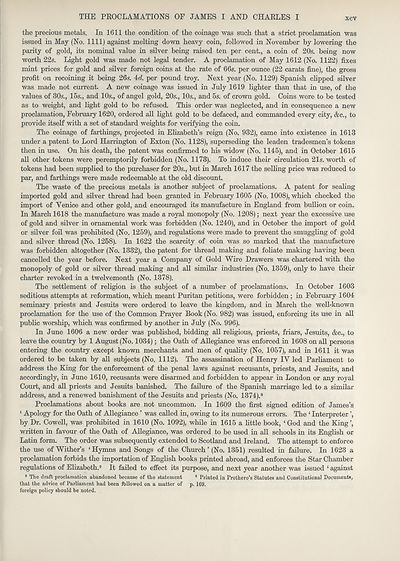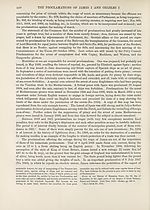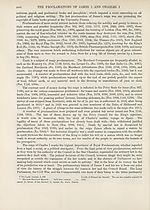Bibliography of royal proclamations of the Tudor and Stuart sovereigns and of others published under authority, 1485-1714 > England and Wales
(107) Page xcv
Download files
Complete book:
Individual page:
Thumbnail gallery: Grid view | List view

THE PROCLAMATIONS OF JAMES I AND CHARLES I
xcv
the precious metals. In 1611 the condition of the coinage was such that a strict proclamation was
issued in May (No. 1111) against melting down heavy coin, followed in November by lowering the
parity of gold, its nominal value in silver being raised ten per cent., a coin of 20s. being now
worth 22s. Light gold was made not legal tender. A proclamation of May 1612 (No. 1122) fixes
mint prices for gold and silver foreign coins at the rate of 66s. per ounce (22 carats fine), the gross
profit on recoining it being 26s. M. per pound troy. Next year (No. 1129) Spanish clipped silver
was made not current. A new coinage was issued in July 1619 lighter than that in use, of the
values of 80s., 15s., and 10s., of angel gold, 20s., 10s., and 5s. of crown gold. Coins were to be tested
as to weight, and light gold to be refused. This order was neglected, and in consequence a new
proclamation, February 1620, ordered all light gold to be defaced, and commanded every city, &c., to
provide itself with a set of standard weights for verifying the coin.
The coinage of farthings, projected in Elizabeth’s reign (No. 932), came into existence in 1613
under a patent to Lord Harrington of Exton (No. 1128), superseding the leaden tradesmen’s tokens
then in use. On his death, the patent was confirmed to his widow (No. 1145), and in October 1615
all other tokens were peremptorily forbidden (No. 1173). To induce their circulation 21s. worth of
tokens had been supplied to the purchaser for 20s., but in March 1617 the selling price was reduced to
par, and farthings were made redeemable at the old discount.
The waste of the precious metals is another subject of proclamations. A patent for sealing
imported gold and silver thread had been granted in February 1605 (No. 1008), which checked the
import of Venice and other gold, and encouraged its manufacture in England from bullion or coin.
In March 1618 the manufacture was made a royal monopoly (No. 1208); next year the excessive use
of gold and silver in ornamental work was forbidden (No. 1240), and in October the import of gold
or silver foil was prohibited (No. 1259), and regulations were made to prevent the smuggling of gold
and silver thread (No. 1258). In 1622 the scarcity of coin was so marked that the manufacture
was forbidden altogether (No. 1332), the patent for thread making and foliate making having been
cancelled the year before. Next year a Company of Gold Wire Drawers was chartered with the
monopoly of gold or silver thread making and all similar industries (No. 1359), only to have their
charter revoked in a twelvemonth (No. 1378).
The settlement of religion is the subject of a number of proclamations. In October 1603
seditious attempts at reformation, which meant Puritan petitions, were forbidden ; in February 1604
seminary priests and Jesuits were ordered to leave the kingdom, and in March the well-known
proclamation for the use of the Common Prayer Book (No. 982) was issued, enforcing its use in all
public worship, which was confirmed by another in July (No. 996).
In June 1606 a new order was published, bidding all religious, priests, friars, Jesuits, &c., to
leave the country by 1 August (No. 1034); the Oath of Allegiance was enforced in 1608 on all persons
entering the country except known merchants and men of quality (No. 1057), and in 1611 it was
ordered to be taken by all subjects (No. 1112). The assassination of Henry IV led Parliament to
address the King for the enforcement of the penal laws against recusants, priests, and Jesuits, and
accordingly, in June 1610, recusants were disarmed and forbidden to appear in London or any royal
Court, and all priests and Jesuits banished. The failure of the Spanish marriage led to a similar
address, and a renewed banishment of the Jesuits and priests (No. 1374).8
Proclamations about books are not uncommon. In 1609 the first signed edition of James’s
‘ Apology for the Oath of Allegiance ’ was called in, owing to its numerous errors. The ‘ Interpreter ’,
by Dr. Cowell, was prohibited in 1610 (No. 1092), while in 1615 a little book, ‘ God and the King ’,
written in favour of the Oath of Allegiance, was ordered to be used in all schools in its English or
Latin form. The order was subsequently extended to Scotland and Ireland. The attempt to enforce
the use of Wither’s ‘ Hymns and Songs of the Church ’ (No. 1351) resulted in failure. In 1623 a
proclamation forbids the importation of English books printed abroad, and enforces the Star Chamber
regulations of Elizabeth.9 It failed to effect its purpose, and next year another was issued ‘ against
8 The draft proclamation abandoned because of the statement 9 Printed in Prothero’s Statutes and Constitutional Documents,
that the advice of Parliament had been followed on a matter of p. 169.
foreign policy should be noted.
xcv
the precious metals. In 1611 the condition of the coinage was such that a strict proclamation was
issued in May (No. 1111) against melting down heavy coin, followed in November by lowering the
parity of gold, its nominal value in silver being raised ten per cent., a coin of 20s. being now
worth 22s. Light gold was made not legal tender. A proclamation of May 1612 (No. 1122) fixes
mint prices for gold and silver foreign coins at the rate of 66s. per ounce (22 carats fine), the gross
profit on recoining it being 26s. M. per pound troy. Next year (No. 1129) Spanish clipped silver
was made not current. A new coinage was issued in July 1619 lighter than that in use, of the
values of 80s., 15s., and 10s., of angel gold, 20s., 10s., and 5s. of crown gold. Coins were to be tested
as to weight, and light gold to be refused. This order was neglected, and in consequence a new
proclamation, February 1620, ordered all light gold to be defaced, and commanded every city, &c., to
provide itself with a set of standard weights for verifying the coin.
The coinage of farthings, projected in Elizabeth’s reign (No. 932), came into existence in 1613
under a patent to Lord Harrington of Exton (No. 1128), superseding the leaden tradesmen’s tokens
then in use. On his death, the patent was confirmed to his widow (No. 1145), and in October 1615
all other tokens were peremptorily forbidden (No. 1173). To induce their circulation 21s. worth of
tokens had been supplied to the purchaser for 20s., but in March 1617 the selling price was reduced to
par, and farthings were made redeemable at the old discount.
The waste of the precious metals is another subject of proclamations. A patent for sealing
imported gold and silver thread had been granted in February 1605 (No. 1008), which checked the
import of Venice and other gold, and encouraged its manufacture in England from bullion or coin.
In March 1618 the manufacture was made a royal monopoly (No. 1208); next year the excessive use
of gold and silver in ornamental work was forbidden (No. 1240), and in October the import of gold
or silver foil was prohibited (No. 1259), and regulations were made to prevent the smuggling of gold
and silver thread (No. 1258). In 1622 the scarcity of coin was so marked that the manufacture
was forbidden altogether (No. 1332), the patent for thread making and foliate making having been
cancelled the year before. Next year a Company of Gold Wire Drawers was chartered with the
monopoly of gold or silver thread making and all similar industries (No. 1359), only to have their
charter revoked in a twelvemonth (No. 1378).
The settlement of religion is the subject of a number of proclamations. In October 1603
seditious attempts at reformation, which meant Puritan petitions, were forbidden ; in February 1604
seminary priests and Jesuits were ordered to leave the kingdom, and in March the well-known
proclamation for the use of the Common Prayer Book (No. 982) was issued, enforcing its use in all
public worship, which was confirmed by another in July (No. 996).
In June 1606 a new order was published, bidding all religious, priests, friars, Jesuits, &c., to
leave the country by 1 August (No. 1034); the Oath of Allegiance was enforced in 1608 on all persons
entering the country except known merchants and men of quality (No. 1057), and in 1611 it was
ordered to be taken by all subjects (No. 1112). The assassination of Henry IV led Parliament to
address the King for the enforcement of the penal laws against recusants, priests, and Jesuits, and
accordingly, in June 1610, recusants were disarmed and forbidden to appear in London or any royal
Court, and all priests and Jesuits banished. The failure of the Spanish marriage led to a similar
address, and a renewed banishment of the Jesuits and priests (No. 1374).8
Proclamations about books are not uncommon. In 1609 the first signed edition of James’s
‘ Apology for the Oath of Allegiance ’ was called in, owing to its numerous errors. The ‘ Interpreter ’,
by Dr. Cowell, was prohibited in 1610 (No. 1092), while in 1615 a little book, ‘ God and the King ’,
written in favour of the Oath of Allegiance, was ordered to be used in all schools in its English or
Latin form. The order was subsequently extended to Scotland and Ireland. The attempt to enforce
the use of Wither’s ‘ Hymns and Songs of the Church ’ (No. 1351) resulted in failure. In 1623 a
proclamation forbids the importation of English books printed abroad, and enforces the Star Chamber
regulations of Elizabeth.9 It failed to effect its purpose, and next year another was issued ‘ against
8 The draft proclamation abandoned because of the statement 9 Printed in Prothero’s Statutes and Constitutional Documents,
that the advice of Parliament had been followed on a matter of p. 169.
foreign policy should be noted.
Set display mode to: Large image | Transcription
Images and transcriptions on this page, including medium image downloads, may be used under the Creative Commons Attribution 4.0 International Licence unless otherwise stated. ![]()
| Permanent URL | https://digital.nls.uk/106225222 |
|---|
| Attribution and copyright: |
|
|---|
| Description | Privately printed catalogues of the special collections of the Bibliotheca Lindesiana, the family library of the Earls of Crawford and Balcarres. Reformation Tracts, English Newspapers and De Bry Collection catalogues provide the only record of the contents of these collections. Also include catalogues of Bibliotheca Lindesiana collections now held elsewhere. |
|---|

